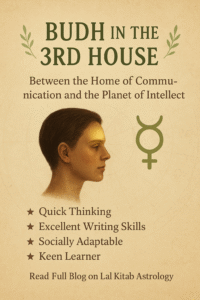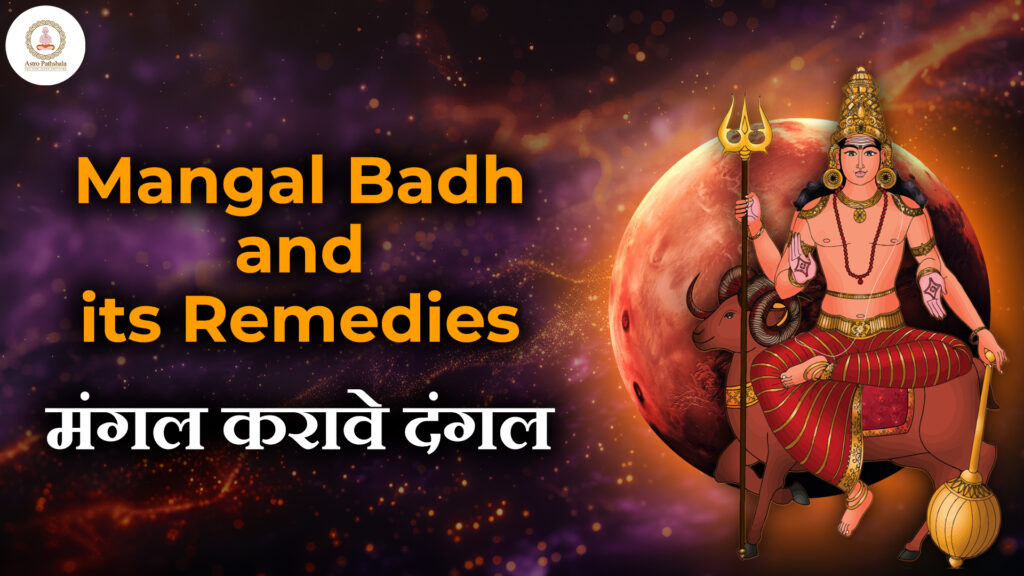
Introduction
There is a quiet courtyard in every life where words, courage, and curiosity sit together like children playing with lamps at twilight. This courtyard, in the language of Lal Kitab, is the third house, the space of brothers, neighbours, communication, and the daring spirit of one’s mind. When Budh, the ever-youthful Mercury, takes his seat here, the courtyard becomes lively with chatter, laughter, stories, and sometimes, whispered conspiracies.
Budh in the third house is like a flute placed in the hands of a village boy; it may produce music that enchants everyone around, or it may turn into a mischievous whistle disturbing the peace. The third house of Lal Kitab is compared to the walls of the house, which carry the sound of every spoken word and echo the courage within the family. Budh, being the planet of speech, wit, and intelligence, colours these walls with its quicksilver energy.
Before we explore its blessings and its pitfalls, let us understand Budh’s true nature, for in Lal Kitab, no planet is merely a stone in the sky; it is a living guest in the mansion of life.
The Nature of Budh
Budh, Mercury, is the celestial prince, youthful, quick, adaptable, and always ready for dialogue. In the Vedas, he is the son of Chandra (the Moon) and Tara, blessed with a sharp intellect and mastery over learning. He governs communication, commerce, logic, and curiosity. Where the Sun shines like a king and Jupiter blesses like a guru, Budh flits about like a messenger, a scribe, or a clever artisan, weaving the threads of thought into speech and transaction.
In Lal Kitab’s symbolic vision, Budh is like the lamp kept in the treasury; it may illuminate the wealth within, or if wrongly placed, may set fire to the very same riches. In the third house, Budh is naturally strong, for this is the house of courage and communication, where his restless nature finds an open playground. But as with all children, when uncontrolled, Budh’s energy may lead to mischief, gossip, or falsehood.
Positive Effects of Budh in the Third House
When Budh shines brightly in the third house, the courtyard of life becomes filled with intelligence, wit, and friendly courage. The native becomes eloquent, with the ability to win hearts through words. The voice may carry a sweetness that soothes others, or a cleverness that entertains and educates. Such a person often becomes a bridge between people, resolving disputes with laughter or wisdom.
In the family sphere, Budh blesses good relations with siblings. Brothers and sisters may become companions in trade, travel, or spiritual journeys. Just as a well-kept lamp lights up not only its own room but spills its glow into the neighbour’s yard, so too does Budh’s energy spread into relationships with friends and neighbours.
Professionally, this placement can bless writers, teachers, traders, publishers, and even actors in any role where voice, pen, or expression is the key. Budh here gives the courage to experiment with ideas and the youthful drive to keep learning throughout life. Such a person may be like a traveller who carries a bag full of books and stories, sharing wisdom wherever he goes.
Adverse Effects of Budh in the Third House
Yet, just as a lamp may cast shadows, Budh’s mischievous side in the third house can create troubles. If afflicted by malefics like Rahu, Ketu, or Saturn, Budh may turn speech into a weapon. The person may indulge in lies, deceit, gossip, or manipulation, causing strife within the family. Words that should heal may instead cut like thorns.
Relations with siblings may suffer, and arguments over property, business, or pride may arise. Neighbours may become enemies, and the person may find himself entangled in petty disputes. Just as a cracked wall spreads the sound unevenly, afflicted Budh makes communication unclear or misunderstood, leading to unnecessary conflicts.
On the inner plane, Budh’s restless curiosity may turn into anxiety, indecision, or overthinking. The native may waste energy in short-lived schemes, chasing profits without depth. In Lal Kitab, such a Budh is like a lamp burning too fast, consuming its own oil before the night is over.
Lal Kitab Symbolism
Lal Kitab uses images such as walls, lamps, and courtyards to explain Budh in the third house. If Budh is positive, it helps communication and unity in the family. If negative, it can cause arguments or misunderstandings through speech.
Imagine a house where every wall is painted with inscriptions, stories, and trade accounts. This is Budh’s gift—communication etched into daily life. The native becomes the storyteller of his clan, the one whose words hold power. But if Budh burns with arrogance, the same walls may become a canvas for graffiti of slander and mistrust.
The lamp in the courtyard is another image: when steady, it illuminates family bonds and guides travellers at night. When flickering, it confuses those who seek direction. Budh, therefore, asks the native to handle words like sacred lamps, measured, steady, and luminous.
Remedies in Lal Kitab
Lal Kitab offers practical actions to harmonise planetary energies. For Budh in the third house, the key is to maintain honest and kind communication, and to foster good relationships with siblings and neighbours.
Some traditional Lal Kitab remedies include:
- Feeding green fodder to cows calms Budh’s restless nature. Cows symbolise patience and nourishment.
- Wearing silver or using silver utensils cools Budh’s excessive fire and brings clarity.
- Avoid false promises or unnecessary oaths. Words are Budh’s currency, and wrong use brings karmic debt.
- Help siblings and neighbours selflessly. Kind acts repair the third house’s walls and ensure harmony.
- Light a lamp with mustard oil in the courtyard. This follows Lal Kitab’s imagery and turns Budh’s energy into steady guidance.
These remedies are not superstitions but symbolic actions. Each one reminds the native to nurture truth, patience, and service in daily life.
A Classical Touch
The sages often emphasised the power of speech and intellect. A verse from the Rig Veda resonates deeply with Budh in the third house:
“वाचं अज्ञा उपसते, वाचं विश्र्वा भुवनानि”
Vācam ajñā upasate, vācaṁ viśvā bhuvanāni
“Fools pursue speech without understanding, but speech itself sustains all the worlds.”
For Budh in the third house, this shloka reminds us: words are not mere sounds. They are sacred forces that shape reality. Misusing them damages the walls of one’s life. Honouring them sustains the universe within and beyond.
Conclusion
Budh in the third house is a young storyteller in the courtyard of destiny. He carries a flute, a book, and a mischievous smile. Guided wisely, his flute unites families, his book spreads knowledge, and his wit lights courage in every heart. Left unchecked, his flute becomes a shrill whistle, his book turns to gossip, and his lamp becomes a flickering flame, unsettling the household.
Lal Kitab’s message is simple and profound: guard your words as you guard wealth. Words are the lamps that light your life’s mansion. Budh in the third house can make one a merchant of wisdom, a poet of courage, and a friend to all, if the lamp of truth is steady.
In the end, Mercury’s laughter shows this truth: courage is not in the sword, but in a voice that speaks with clarity and kindness. In any courtyard where such a voice is heard, the neighbourhood becomes a temple of peace.


